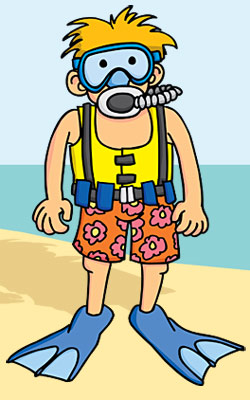Pressure Changes Can Cause Tooth & Sinus Pain
Dental pain while flying or diving
Dear Doctor,
Last time I went scuba diving I got severe pain in my upper left sinus and back teeth area. In fact it even started to hurt biting down on my mouthpiece. Is this common and what should I do?

Dear Will,
Your question raises some interesting points. Not only do divers experience discomfort or pain from time to time, but also people who travel in airplanes. The common link is in the body's response to pressure changes — lower air pressure in the cabin of a plane and increasing pressure when you dive beneath the sea. The pain you feel is because of what is termed “barotrauma” (baro-pressure, trauma-injury) commonly referred to as a “squeeze.”
Squeezes occur when pressures outside the body and inside the body are not equalized. All body organs (for example bones, blood, muscles) transmit pressures equally from outside to inside, with changes in the ambient (external – outside the body) pressure. But, pressure changes can cause problems in the body structures that are filled with air and that are lined with rigid walls such as the middle ear spaces and the sinus cavities of the skull.
You've probably noticed how your ears “pop” when quickly changing altitude, in an airplane or even a car. Swallowing, yawning, moving the lower jaw from side-to-side and/or pinching the nostrils closed while forcefully exhaling (known as the Valsalva maneuver) are common ways to equalize pressure. Effectively what we're doing with these maneuvers is “clearing” or equalizing the pressure in these air-filled rigid walled structures — the middle ear spaces behind the ear drums and the sinuses.
In addition, the sinuses have small openings (ostia) near their lower borders, which make it possible to “clear” with changes in external pressures and also to drain fluid that accumulates in them. When inflamed and swollen such as after a head cold or flu, these “mucous” producing membranes become filled with fluid (responsible for the heavy headed or awful clogged feeling). It then becomes very difficult and sometimes impossible to equalize the pressure in these structures with changes in external pressures.
Now to more directly answer your question, the largest sinuses in the skull are the maxillary (upper jaw) sinuses; they are oblong shaped and located below the eyes, adjacent to the nose. It is important to note that their lower walls are adjacent to the back teeth of the upper jaw. This is of critical importance because they share the same pain perceiving nerves as the maxillary sinuses. It is therefore not uncommon for people who have a toothache resulting from infection in upper back teeth to feel pain in the maxillary sinuses or vice-versa, for people who have a sinus infection to feel pain in their teeth. This is called “referred pain” because of the common or shared nerves.
If you are having intermittent or continuous pain in your back teeth, consult your dentist. It is important to be dentally healthy, especially before you dive. Any defect in a filling or tooth can potentially trap air, which theoretically can lead to a toothache caused by pressure changes leading to a squeeze — there's even a specific name for it — barodontalgia (baro-pressure, dont-tooth, algia-pain or disorder). In fact, the first sign of a cracked or fractured tooth may be a pain response to pressure change.
Biting down hard on a mouthpiece (to which the breathing tubes or regulator are attached) has also been reported to cause dental problems, even described by some as “diver's mouth syndrome.” Most of the available mouthpieces in this particular sport are stock or standard sizes — mainly two or three standards designed to fit all mouth sizes. It is common for them to fit poorly and even lead to gum laceration, tooth pain from biting down hard (a mouthpiece is not something you want to lose at depth), or even jaw joint pain (also known as TMD — temporo-mandibular joint dysfunction — bit of a mouthful so to speak).
Bottom line — go visit your dentist, rule out any gum disease, tooth decay, cracked fillings or teeth and TMD as a cause of your problem. Consider having a custom diving mouthpiece made or at least a well fitting one that really is comfortable. If your sinus symptoms still persist, see your physician. Medications that shrink the mucous membranes if inflamed, together with a diver's experience at equalizing pressure in the middle ear and sinuses, can prevent these problems. You may also consider having your dentist and physician talk to each other if your problem has not been resolved.



